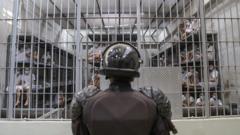Repeated detentions and visa revocations related to student activism have created a climate of fear on US campuses, with many feeling unsafe and paranoid about their immigration status.
Concerns Rise Among Foreign Students in the US as Visa Revocations Skyrocket

Concerns Rise Among Foreign Students in the US as Visa Revocations Skyrocket
Anxiety spreads as international students face detentions and sudden visa cancellations amid political tensions.
In recent weeks, a wave of anxiety has swept through foreign student communities across universities in the United States as reports of sudden detentions and visa revocations have surged. Many international students are posting about alarming incidents on social media, where plain-clothes agents are reportedly apprehending students simply for their involvement in pro-Palestinian protests. The situation has raised significant concerns, as many individuals taken into custody have not faced any formal charges.
According to data from Inside Higher Ed, over 1,000 foreign students and recent graduates have had their visas revoked or legal statuses altered, leading to heightened anxieties on campuses nationwide. As students and educators from public universities to elite institutions express their fears, many students describe an atmosphere where they feel vulnerable and unsafe.
“I could be next,” confessed a Georgetown University student who has written critically about Israel. He now carries a card listing his constitutional rights, fearing unwanted encounters with law enforcement. Another student from Texas stated he has become too fearful to leave his apartment, even for essential errands like grocery shopping. The vice grip of anxiety is felt deeply, as many students spoke anonymously, worried that any public acknowledgment could draw attention from authorities.
While some visa cancellations appear related to prior criminal records, in many cases, the reasons remain unclear. Allegations from officials suggest that anti-Israel demonstrations have drawn the attention of federal departments, with Secretary of State Marco Rubio having stated that a crackdown is underway against those involved in protests considered disruptive to campus safety.
Civil liberties groups have voiced strong opposition to these detentions and alleged violations of constitutional rights. Many international students assert that they are being unfairly targeted due to their political positions rather than any actual threats they pose.
The landscape at Georgetown has shifted, with signs stating “Protect Our Students” proliferating across campus, juxtaposed against the vibrant spring setting. Detained students include researchers and activists, such as Badar Khan Suri, accused of promoting antisemitism due to social media activity, and Mahmoud Khalil from Columbia University, designated as the alleged “ringleader” of campus protests.
With the Biden administration prioritizing policies aimed at combating dissent, extensive funding for institutions such as Harvard has been threatened due to a refusal to comply with demands from the White House. Students and faculty alike have expressed concerns about the chilling effect on academic freedom and discourse.
The burgeoning fear extends beyond students engaged in protests; simple academic critiques of US foreign policy have led to alarming situations where students feel perpetually at risk. As one graduate student put it, “I’m afraid that if I’ve ever said something that wasn't well received, it could come back to haunt me.”
Universities are grappling with the implications of these developments, revealing a complex intersection of immigration, activism, and political tensions that have created an unsettling environment for students from abroad. As the movement continues, the national conversation about immigration policy and civil liberties remains in sharp focus.



















